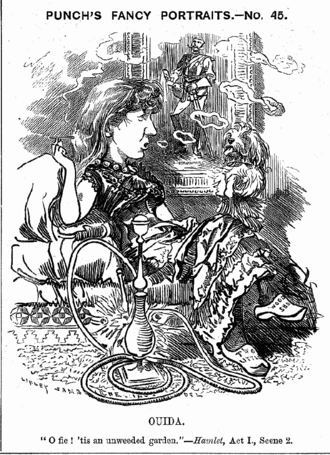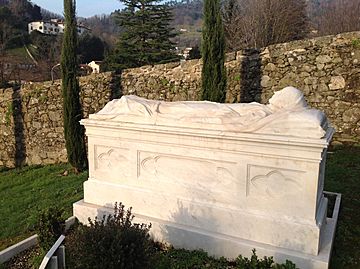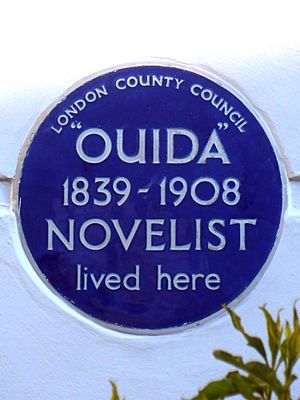Ouida facts for kids
Quick facts for kids
Maria Louise Ramé
|
|
|---|---|
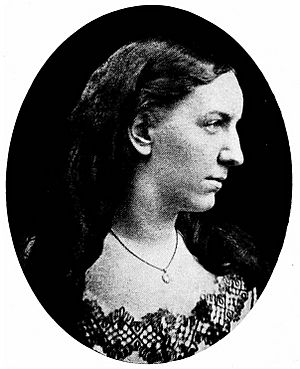
Photograph by Adolphe Beau, c. 1867–1871
|
|
| Born | 1 January 1839 Bury St Edmunds, England |
| Died | 25 January 1908 (aged 69) Viareggio, Italy |
| Pen name | Ouida |
| Occupation | Novelist |
| Nationality | English-French |
| Signature | |
 |
|
Ouida (born Maria Louise Ramé, though she preferred Marie Louise de la Ramée) was a famous English novelist. She was born on January 1, 1839, and passed away on January 25, 1908. Ouida was her special pen name, which came from how she said "Louise" as a child.
During her life, Ouida wrote over 40 novels, plus short stories, children's books, and essays. She was quite successful and enjoyed a fancy lifestyle. She often hosted parties for important writers and artists of her time.
One of her most well-known novels, Under Two Flags, was about the British in Algeria. It showed understanding for the French people who lived there and also for the Arabs. This book was so popular that it was made into a play and filmed six times! Her book A Dog of Flanders is a classic children's story, especially loved in many parts of Asia. The famous American writer Jack London even said that Ouida's novel Signa helped him become a successful writer.
Even though she earned a lot, Ouida spent money quickly. This led to her having financial problems later in life. She died in Italy from pneumonia. After she passed away, her friends raised money to put up a special fountain for horses and dogs in her hometown, Bury St Edmunds, to remember her.
Contents
Early Life and Name
Maria Louise Ramé was born in Bury St Edmunds, England. Her mother, Susan Sutton, was the daughter of a wine seller. Her father was from France.
Ouida got her unique pen name from how she used to say her given name, "Louise," when she was a little girl. She had mixed feelings about her hometown. She once wrote that it was a "clean, quiet" place that reminded her of an "old maid dressed for a party." She also joked that the streets were so quiet, people had to ring their own doorbells so they wouldn't rust!
Her Writing Career
In 1867, Ouida moved to the Langham Hotel, London. It's said that she wrote her stories in bed, by candlelight, with the curtains closed to block out the sun. She loved to be surrounded by purple flowers. She spent a lot of money on hotel bills and flowers, sometimes as much as £200 a week!
She hosted many parties, called "soirées," where she invited soldiers, politicians, and famous writers like Oscar Wilde and Robert Browning. She also invited artists like John Millais. Many of the people she met at these parties became characters in her books. Someone who knew her, William Allingham, described Ouida as short, with a "clever face" and a "voice like a carving knife."
Ouida lived in London for many years. Around 1871, she moved to Italy. In 1874, she settled down in Florence with her mother. There, she continued to write many novels. She lived in a grand style, hosted many guests, collected beautiful art, and dressed in expensive clothes. She also loved animals very much and kept many dogs, sometimes as many as thirty! She was very devoted to them.
She once said that she never received more than £1600 for any single novel from her publishers. However, she found America to be "a mine of wealth" for her books. In her novel The Massarenes (1897), she wrote about rich people in London society. This book was very important to Ouida and sold very well.
Ouida saw herself as a serious artist. She was especially inspired by Lord Byron. She also loved other artists. Her later novels often featured sad painters and singers. Her writing often mixed romantic stories with comments about society. In her novel Puck, a talking dog shares his thoughts on the world. She also wrote essays about different social topics.
Even though she was successful, Ouida wasn't good at managing her money. In 1906, she was offered a special pension of £150 a year by the prime minister, Sir Henry Campbell-Bannerman. She didn't want to take it at first, but her friend, Lady Howard, convinced her.
Ouida continued to live in Italy until she died on January 25, 1908, in Viareggio, from pneumonia. She is buried in the English Cemetery in Bagni di Lucca, Italy.
Champion for Animals
Ouida was a strong supporter of animal rights. She was also very against vivisection, which is experimenting on live animals. In 1897, she wrote a book called The New Priesthood: A Protest Against Vivisection.
She also wrote articles in magazines like The Gentleman's Magazine and The Fortnightly Review, speaking out against animal experiments. Ouida was also against the fur trade and hunting. She truly loved and cared for animals.
Her Books and Stories
Ouida wrote over 40 novels, children's books, and collections of short stories and essays. Her writing style changed over time.
In 1863, when she was 24, she published her first novel, Held in Bondage. She later said she wrote her popular novel Idalia (1867) when she was only 16! This book featured a rebellious young woman who supported Italian independence.
Her early novels were seen as exciting and adventurous. They were different from the more serious books of that time. They mixed thrilling stories with early adventure tales. Later, her work became more like historical romance, but she always continued to comment on society. She also wrote several stories especially for children.
Under Two Flags is one of her most famous novels. It described the British in Algeria. The book showed understanding for the French people living there and, to some extent, the Arabs. This novel was turned into a play and filmed six times. The American author Jack London said that Ouida's novel Signa, which he read when he was eight, was one of the reasons for his success as a writer.
Her Legacy
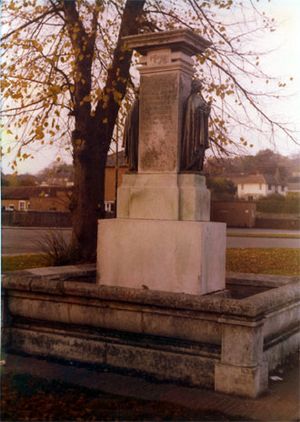
Soon after Ouida's death, her friends collected money in Bury St Edmunds, her birthplace. They used the money to build a fountain for horses and dogs in her name. The words on the fountain were written by Lord Curzon. They say: "Her friends have erected this fountain in the place of her birth. Here may God's creatures whom she loved assuage her tender soul as they drink." This shows how much she cared for animals.
Another author, "Rita" Humphreys, wrote a tribute to Ouida after she died. This tribute was read when Ouida's memorial was unveiled. When Rita was young, she wasn't allowed to read Ouida's books because they were considered too "racy." But later in life, Rita bought every book Ouida wrote and kept them in her library.
Movies Based on Her Books
Many of Ouida's novels have been made into movies over the years. Here are some of them:
- Moths (1913)
- Strathmore (1915)
- The Little Dutch Girl (1915)
- Under Two Flags (1916)
- Her Greatest Love (1917)
- Two Little Wooden Shoes (1920)
- Under Two Flags (1922)
- A Boy of Flanders (1924)
- In Maremma (1924)
- Flames of Desire (1924)
- A Dog of Flanders (1935)
- Under Two Flags (1936)
- A Dog of Flanders (1960)
- Dog of Flanders (1975, an animated TV series from Japan)
- Romance: Moths (1977, a UK TV film)
- A Dog of Flanders (1999)
See also
 In Spanish: Ouida para niños
In Spanish: Ouida para niños
 | Emma Amos |
 | Edward Mitchell Bannister |
 | Larry D. Alexander |
 | Ernie Barnes |


